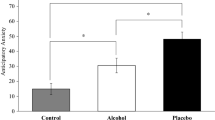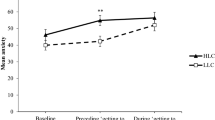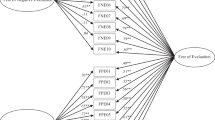Abstract
Thirty-two male social drinkers were randomly assigned to four conditions in a 2 ×2 factorial design that controlled for differential expectations concerning alcohol consumption in a dyadic social interaction. Subjects were led to believe that they had consumed either alcohol or tonic water (no alcohol was actually administered)prior to interacting with a female confederate. Half of each of these groups were told that the confederate was another subject in the study who had just consumed a moderate amount of alcohol; the other half were simply informed that the confederate was another subject. Multiple measures of anxiety, including heart rate, observational ratings, and self-report, were obtained. Subjects who believed that the female had been drinking showed significantly less anxiety than their counterparts who did not have this information. There were no major effects of the self-intoxication expectation. The theoretical significance of these findings is discussed.
Similar content being viewed by others
References
Abrams, D. B., & Wilson, G. T. Effects of alcohol on social anxiety in women: Cognitive versus physiological processes.Journal of Abnormal Psychology 1979,88 161–173.
Anderson, N. Cognitive algebra: Integration theory applied to social attribution. In L. Berkowitz (Ed.),Advances in experimental social psychology. New York: Academic Press, 1974.
Borkovec, T. D., Stone, N. M., O'Brien, G. T., & Kaloupek, D. G. Evaluation of a clinically relevant target behavior for analogue outcome research.Behavior Therapy 1974,5 504–514.
Cappell, H. An evaluation of tension models of alcohol consumption. In R. J. Gibbins, Y. Israel, H. Kalant, R. E. Popham, W. Schmidt, & R. G. Smart (Eds.),Research advances in alcohol and drug problems (Vol. 2). New York: Wiley, 1974.
Caudill, B., & Marlatt, G. A. Modeling influences in social drinking: An experimental analogue.Journal of Consulting and Clinical Psychology 1975,43 405–415.
Geer, G. H. The development of a scale to measure fear.Behaviour Research and Therapy 1965,3 45–53.
Marlatt, G. A., & Rohsenow, D. J. Cognitive processes in alcohol use: Expectancy and the balanced placebo design. In N. K. Mello (Ed.),Advances in substance abuse: Behavioral and biological research. Greenwich, Connecticut: JAI Press, in press.
Oates, J. F., & McCoy, R. T.Laboratory evaluation of alcohol safety interlock systems, Volume III—Instrument performance at high BALs. Report to the Highway Research Institute, National Highway Traffic Safety Administration, Department of Transportation, Washington, D.C., 1973.
Rachman, S.Fear and courage. San Francisco: Freeman, 1978.
Rehm, L. P., & Marston, A. R. Reduction of social anxiety through modification of self-reinforcement: An instigation therapy technique.Journal of Consulting and Clinical Psychology 1968,32 565–574.
Spielberger, C. D., Gorsuch, R. L., & Lushene, R. E.The State-Trait Anxiety Inventory (test manual). Palo Alto: Consulting Psychologists Press, 1970.
Wilson, G. T. Alcohol and human sexual behavior.Behaviour Research and Therapy 1977,15 239–252.
Wilson, G. T. Booze, beliefs, and behavior: Cognitive processes in alcohol use and abuse. In P. E. Nathan & G. A. Marlatt (Eds.),Alcoholism: New directions in behavioral research and treatment. New York: Plenum Press, 1978.
Wilson, G. T. Perceived control and the theory and practice of behavior therapy. In L. C. Perlmuter & R. A. Monty (Eds.),Choice and perceived control. Hillsdale, New Jersy: Erlbaum, 1979.
Wilson, G. T. Alcohol and anxiety: Recent research on the tension reduction hypothesis of alcohol use and abuse. In K. Blankstein & J. Polivy (Eds.),Advances in the study of communication and effect. New York: Plenum Press, in press.
Wilson, G. T. & Abrams, D. B. Effects of alcohol on social anxiety and physiological arousal: Cognitive versus pharmacological processes.Cognitive Therapy and Research 1977,1 195–210.
Wilson, G. T., Abrams, D. B., & Lipscomb, T. R. Effects of increasing levels of intoxication and drinking pattern on social anxiety.Journal of Studies on Alcohol 1980,41 250–264.
Wolpe, J.The practice of behavior therapy. New York: Pergamon Press, 1973.
Author information
Authors and Affiliations
Additional information
This research was supported by National Institute of Alcoholism and Alcohol Abuse Grant AA 00259-09. The authors are grateful to Tom Lipscomb, Lorraine O'Brien, Harry Heermans, and other members of the Rutgers Alcohol Behavior Research Laboratory for their assistance in completing this study.
Rights and permissions
About this article
Cite this article
Wilson, G.T., Perold, E.A. & Abrams, D.B. The effects of expectations of self-intoxication and partner's drinking on anxiety in dyadic social interaction. Cogn Ther Res 5, 251–264 (1981). https://doi.org/10.1007/BF01193409
Issue Date:
DOI: https://doi.org/10.1007/BF01193409




